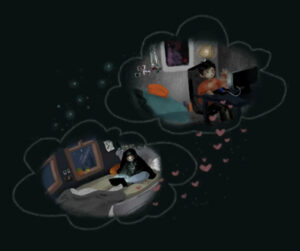This post was written by NCTE member Adam Mackie.
“It was the best of times, it was the worst of times, it was the age of wisdom, it was the age of foolishness, it was the epoch of belief, it was the epoch of incredulity, it was the season of Light, it was the season of Darkness, it was the spring of hope, it was the winter of despair, we had everything before us, we had nothing before us, we were all going direct to Heaven, we were all going direct the other way—in short, the period was so far like the present period, that some of its noisiest authorities insisted on its being received, for good or for evil, in the superlative degree of comparison only.”
—Charles Dickens, A Tale of Two Cities
“I went to the woods because I wished to live deliberately, to front only the essential facts of life, and see if I could not learn what it had to teach, and not, when I came to die, discover that I had not lived. —Henry David Thoreau, Walden
In the Anchorage School District in Alaska, we never returned to our buildings after Spring Break to finish the fourth quarter of 2020. As social distancing, self-isolation, and quarantines began in the “land of the midnight sun,” students at West Anchorage High School turned to an online teaching and learning platform to receive instruction for the remainder of the school year. Teachers and students did their very best to cope, find hope, and continue with educational life.
As an English language arts teacher, striving to balance a prefabricated curriculum designed by Florida Virtual School a few thousand miles away and housed on Instructure’s Canvas, I offered students multiple, optional creative writing outlets to supplement their online learning. I assigned students a writing experiment with the objective of expressing feelings related to the COVID-19 pandemic. I emailed students a sample poem titled “Pandemic of Peace.”

I also provided a simple prompt, when sending out “Pandemic of Peace” to students, and encouraged them to write something on their own. I asked students to respond to the way they felt about everything that was happening in the world, in any form (i.e., a short story, a poem, a drawing, a video, an audio recording, etc.).
Zachary, a student in first-year English from my fourth period, wrote a moving piece of writing about an opportunity his father provided him while doing school work from home:
My dad and I are always talking about opportunity. It is mostly him coming to me and giving me opportunities. During quarantine, it has been no exception. My dad and I have talked about opportunities ranging from possibly going commercial fishing to getting my pilot’s license this summer.
The most recent opportunity my father came to me with was the opportunity to make a little money building a brick retaining wall. The wall was to be about twelve feet long, four feet tall and it would come to a T with another wall going in the other direction that was about ten feet long and four feet tall. Although it would be hard work, he was offering me good pay so I accepted. I took me and a friend a week to dig a trench for the wall, another week completely leveling the bottom of it and then we finally were able to lay the first brick. Each one was seventy-five pounds, and it was hot and sweaty work.
In the end the entire project took us about three weeks. However, it was worth it and I was paid well for my efforts. Because I took an opportunity, I am a couple hundred dollars richer and now have practical knowledge I will keep forever.
Other students rose to the occasion as well. A couple of first-year girls decided to fulfill a discussion requirement built into the online curriculum by recording a 15- to 20-minute podcast. Lillian and Ava addressed social justice issues in their conversation, including women’s rights in America, access to education nationally and internationally, the influence of a student’s home life on their academic success, and admittance into college. Ava and Lillian took turns asking each other candid questions, exercising effective speaking, listening, and civic discoursing skills (listen to “Opportunity Discussion” audio file HERE).

Another student, Adrienne, a senior and artist in my fifth-hour Classical Mythology elective, created an untitled piece of visual art (see above and/or animated digital sketch HERE). Adrienne showed, in stunning fashion, how connection through online conferencing could facilitate a loving relationship and overcome any distance and culture difference. Zach, Lillian, Ava, and Adrienne all demonstrated how wielding one’s own creativity in the written and spoken word, and in the visual arts, allows the human spirit to transcend the seeming confines of isolation to Thoreauvian heights.
Granted, these students were in the minority to take advantage of these writing experiments, but, perhaps, like Henry David Thoreau at Walden Pond, they were able “to front essential facts of life,” for a moment, and “learn what [they] had to teach” during these unprecedented times of pandemic.
Naturally, much has been lost in terms of teacher-to-student and student-to-student relationships while not meeting face-to-face in a brick and mortar classroom. I miss seeing Zach’s face light up when he finishes asking his umpteenth question and discovers a new direction for what he wants to write about. I miss seeing Adrienne holding her stylus, working on her tablet, creating her next visual masterpiece. I miss seeing Lillian and Ava smiling and laughing along with countless other students who I miss laughing with on a daily basis. I’m certain many of my students miss my “Mackie Medicine” of face-to-face laughter, too.
Nonetheless, as John Dewey has taught us, education is indeed a social process and life itself. And for better or for worse, in these Dickensian “best of times” and “worst of times,” we must move forward. We must move forward whether face-to-face, online, or both. We must move forward together and hold on to hope. We must move forward “with kindness and aforethought” and, as Thoreau says, “go about doing good.”

Adam Mackie teaches mythology, world literature, reading, and writing courses at West Anchorage High School in Anchorage, Alaska, as well as literacies and poetry courses at the University of Alaska Anchorage. He loves going on epic adventures with his two children, Noah and Hazel, and his wife, Margaret.

